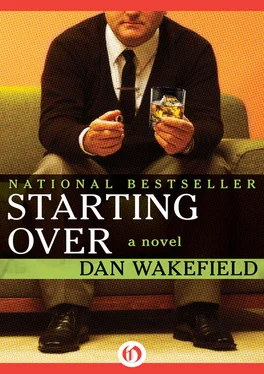All over the country, it seemed, growing numbers of people were giving up the grind, getting out of the rut they were in, and doing what the hell they pleased. It wasn’t just the kids anymore. It was solid, respectable people like auto executives and veterinarians. Not many perhaps, but a growing trickle, a discernible stream. Potter himself knew a couple who had left the publishing business and bought a working farm in New Hampshire. They had sent out a mimeographed newsletter to their old friends in New York, reporting how happy they were and explaining they were “into crop rotation.”
When Potter graduated from college in ’58, nobody did that stuff; at least nobody you knew, nobody who had a good education and a chance of making it in business or the arts or professions. Only the weirdos, the copouts and dropouts who couldn’t cut it anyway left the mainstream of American opportunity, spurned the golden current of success, and really meant it. But now, if you left a good job in a leading law firm and went to northern Vermont to tap maple sugar, you were sort of envied. At least you weren’t scorned. The truth was, as far as Potter could figure it, nobody gave a shit anymore. There was something nice about that. But it was also a little bit scary, as if in the middle of a game you were playing the rules had been changed, or just forgotten about, and you had to pretty much make things up as you went along and pretend you knew what the hell you were doing. On top of that, Potter was uncomfortably aware that for him a good part of the game was already over. He had just turned thirty-four. That was pretty near the halfway mark, or maybe even way past it, the way he was boozing. Time to shit or get off the pot if you were going to make a new move, really start over. And what better time than now, the first year of a new decade? The Seventies. Stretching ahead, as yet only four months soiled.
“You don’t have any children,” Marva Bertelsen said. “You’re free to do anything you want.”
Potter took a swallow of Drambuie. It was sticky, like his mind felt. “The hitch is,” he said, “I have to want to do something.”
He looked to Max, hoping for an answer, a direction, hoping he might say “Go west, young man,” or “Take up the plough,” and Potter would do it. But Max only sipped at his espresso, looking knowledgeable but inscrutable.
Potter met Max in the Service, when they both were stationed at the Navy Department in Washington. Potter as a yeoman typist, Max in the psychiatric division. Max was a shrink, and though Potter never saw him on a professional basis, he kind of adopted him as a father. Max was only three years older than Potter but seemed a lot more than that, maybe because he was so goddamn calm and in control all the time. When Potter met him, Max had recently finished his training analysis, and he seemed to be one of the few people Potter knew for whom that process had “worked.” There was something comforting about the result, but also something Potter found a little bit scary. It was something in Max’s calm, unruffleable demeanor; as if some wire had been unhooked, the one that connected you with anger and frivolity and unpredictable thought and action. Max smiled a lot, but seldom if ever laughed. When something struck him especially funny he would smile and say, “That’s very funny.”
“Those guys in the magazine article,” Potter said, “the article I was telling you about—they all seemed to have some burning desire to do some particular thing they’d never been able to do—but I can’t think of anything like that. Becoming a lobster fisherman or something. You know.”
“What about—your acting?” Marva asked brightly.
“Come on Marva, that’s over,” Potter said forcefully. “Done. Dead. Buried. Gone.”
“OK, I just thought.”
“What about teaching?” Max asked.
“Teaching what? ”
“What you know about—the theatre. Even public relations.”
“Who the hell wants to know about that? ”
“You might be surprised,” Max said with a smile.
“Don’t worry, Phil,” Marva said, “Max knows everyone .”
Potter didn’t doubt that.
When Max and Marva went to bed, Potter stayed up, keeping the fire in the library going, drinking giant Scotch and sodas, pondering his possible futures. He wished, in a way, he could just move in with the Bertelsens—like a black-sheep son, unfit for employment—and hide in the warm safety of their house, their friendly protection, their ordered lives.
The thought of the old dream of acting reminded him of the dangers of the world outside, the dangers of caring and desiring, of wanting something so bad you can taste it, but having it always recede before you until in order to live at all you had to turn your back on it—swear off it as surely as an alcoholic swears off the sauce—and for something less, something else.
The dream had become a memory, still vivid and painful. When Potter finished college and the Navy and came to New York, he came with the casual assumption that—with time and the breaks and professional training—he would emerge as a new Marlon Brando or Jason Robards, and after a successful run on Broadway in a new Tennessee Williams hit, he would hop off to Hollywood, swatting producers away like gnats, and do the star bit, but not let himself be taken in. He played in his mind many times the scene in which he politely told the roomful of Hollywood moguls that he couldn’t accept their fantastic offer for the lead in the screen version of a new Harold Robbins novel, but had chosen instead to return to New York and do Shakespeare in the Park for scale.
After four years of making the rounds, with his smile and his folder of glossy profile photos, he landed one part in a TV drama series in which he dashed into a room and said, “Telegram for Mr. Bostwick.”
It did not lead on to bigger things.
One afternoon at a casting call for parts in a new TV crime series Potter was sitting on the usual bench, crowded with other palmsweating aspirants, his head aching and his feet sore, wanting to take a piss but afraid to be gone in case his name was called, when a door was flung open from the inner sanctum, the warm secret source of carpeted power, and out came a girl he saw around a lot at parties, who was bright and on her way up and treated him with a flirtatious sort of friendliness. Her name was Madeline and she never wore makeup except on her eyelids. They were purple. Potter moved slightly forward, simply to greet her, but before he could open his mouth she flashed by him, and, though her eyes never fell upon him, never made the slightest flicker in his direction, her long delicate arm, as if guided by radar, reached out at the moment she was precisely perpendicular to him, and her longnailed fingers made a quick, fleeting ruffle through his hair, while, at the same split-second she said, “Hi, Love,” and then she was gone, with her papers and her power and her purple eyelids.
Potter sat for a moment not moving; his scalp, where her fingers had flicked across it, felt on fire. He did not see the room, or the people in it, but he stood up and moved, in a trance, to the elevator. It came, and he pressed the lobby button and stood facing front. He turned right, out the glass revolving doors, and with his mind as blank as a newly washed blackboard, he walked to the nearest city trash basket and stuffed in the folder containing his résumé and his glossy photos and walked on, as if guided by an electronic beam, to the nearest sign that said LIQUOR, walked in and asked in a pleasant monotone for a quart of Cutty Sark, hailed a taxi, went back to the apartment he shared with a girl named Tandy who had graduated magna cum laude from Bryn Mawr and was working her way up in publishing and said she would help pay the rent and do the dishes and whatever the fuck needed to be done to help Potter make it in the theatre because she believed both in Potter and the theatre.
Читать дальше












